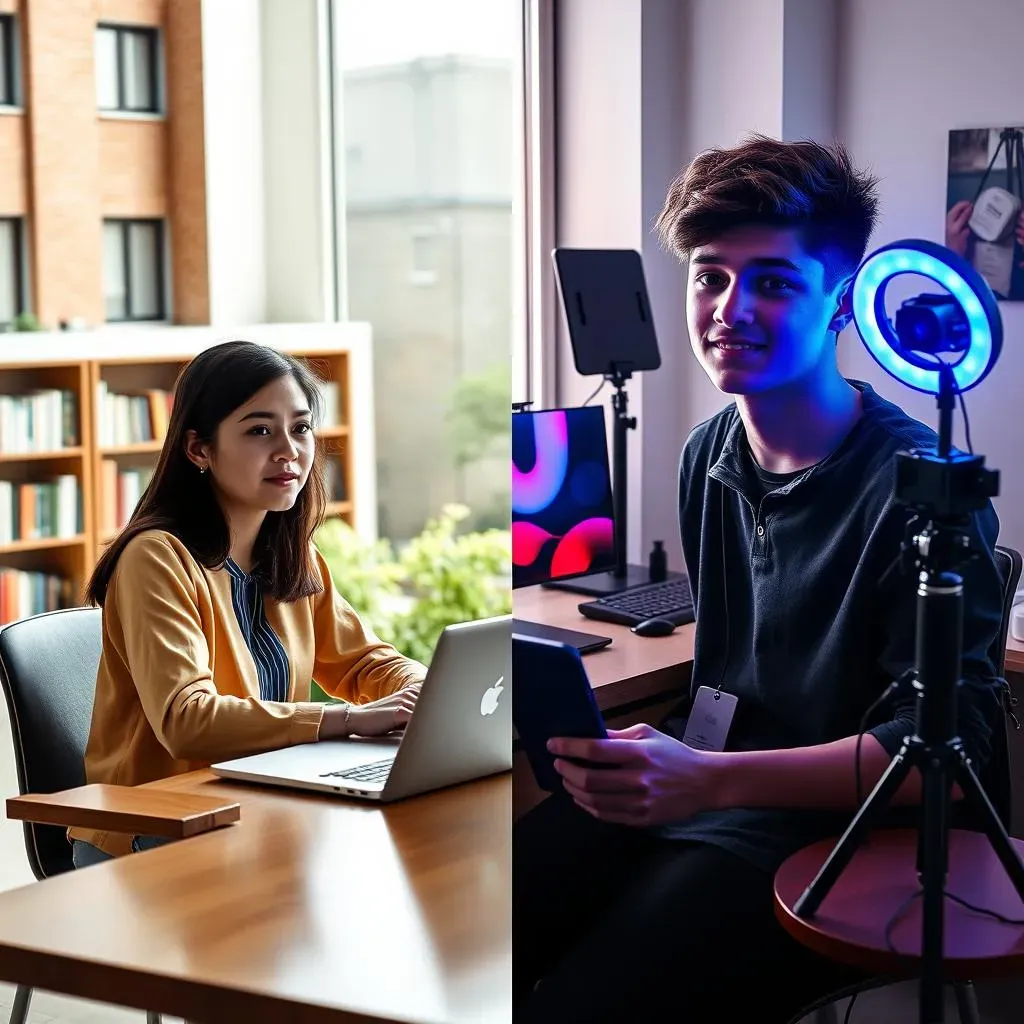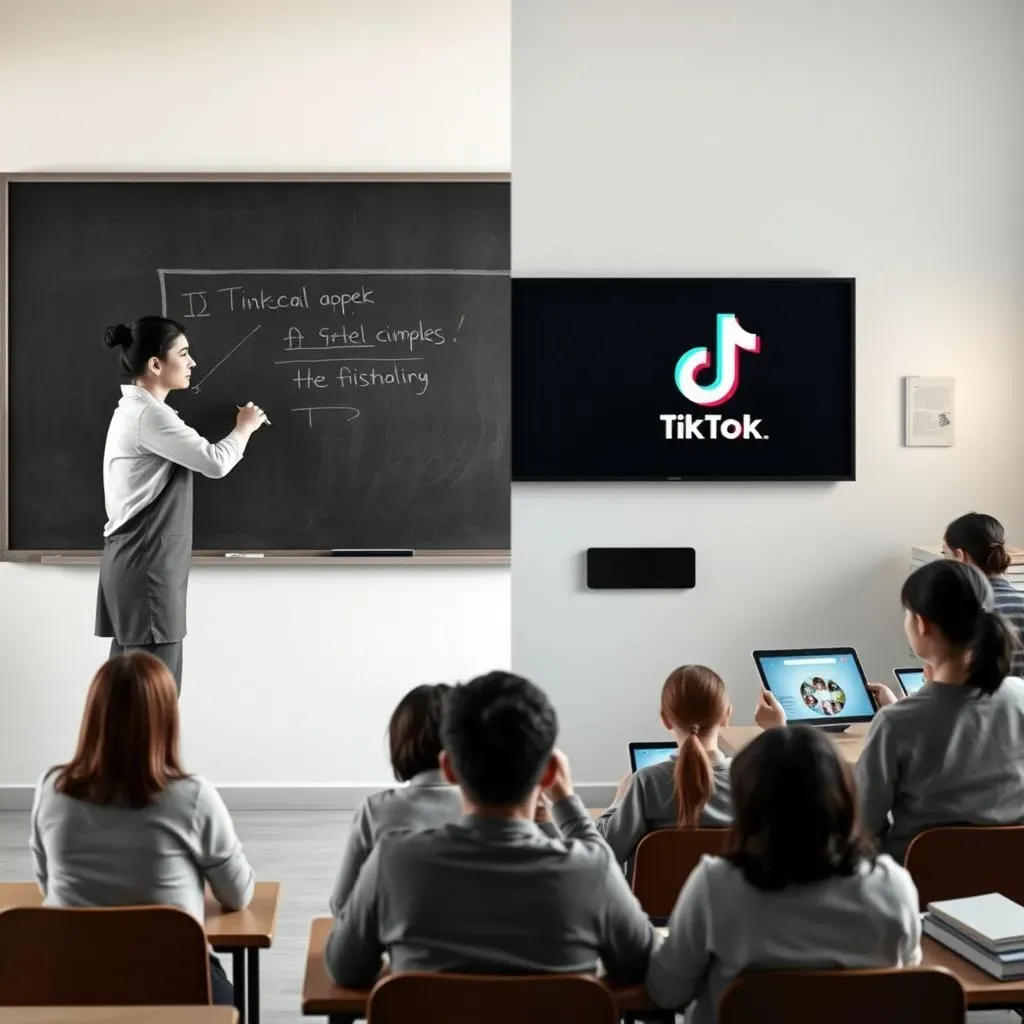Table of Contents
Ever wondered about the educational backgrounds of those captivating TikTok stars who command millions of followers? This article dives into the fascinating world of "TikTok stars educational background," exploring the diverse paths these digital celebrities have taken. We'll examine the surprising range of educational experiences, from formal schooling and prestigious universities to unconventional routes that led them to viral fame. We'll consider whether traditional education is still relevant in the age of social media stardom, and how TikTok itself is impacting education, both positively and negatively. Prepare to be surprised by the diverse stories of success (and sometimes, struggles) that reveal the complex relationship between education and the rapidly evolving landscape of online fame. Get ready to explore the intriguing question: What does it really take to become a TikTok star, and what role does education play? This journey will uncover unexpected insights into the lives of these digital influencers and challenge preconceived notions about the path to success in the 21st century.
Exploring the Educational Paths of TikTok Stars

Exploring the Educational Paths of TikTok Stars
The Traditional Route: College and Beyond
Many TikTok stars followed traditional educational paths, attending high school and then pursuing higher education. Some went on to prestigious universities, earning degrees in various fields. This group often uses their education as a foundation for their online presence, leveraging skills gained in college to create engaging and informative content. For instance, a TikToker with a degree in marketing might use their knowledge to build a successful brand, while a science graduate might share educational videos explaining complex concepts in a simple, digestible manner. The traditional educational background provides a solid base for content creation and business acumen, adding a layer of credibility to their online persona.
It's not always a straightforward path, though. Many face the challenge of balancing academic demands with the ever-growing pressures of maintaining a successful TikTok account. The time commitment required for both can be substantial, leading to considerable stress and potential burnout. This highlights the unique challenges faced by these individuals who are trying to navigate two demanding worlds simultaneously.
TikTok Star | Educational Background | TikTok Niche |
|---|---|---|
Example 1 | Bachelor of Science in Biology | Educational science content |
Example 2 | Master's in Business Administration | Marketing and branding tutorials |
The Unconventional Path: Self-Taught Skills and Online Learning
A significant number of TikTok stars haven't followed a traditional educational route. Many are self-taught, honing their skills through online courses, tutorials, and sheer determination. Their success demonstrates that formal education isn't the only path to expertise. These individuals often possess a natural talent for creativity, editing, and engaging with an audience. They've adapted quickly to the fast-paced world of social media, learning new trends and techniques at an incredible speed. Their success stories underscore the power of self-motivation and the accessibility of online learning resources in today's digital age.
This path, however, isn't without its challenges. Without a formal education, it can be harder to gain credibility and establish oneself in a particular niche. Additionally, self-teaching requires a high degree of discipline and self-motivation, which can be difficult to maintain over the long term. The lack of structured learning can also lead to gaps in knowledge, potentially limiting their potential for growth and diversification. This group often relies heavily on their innate abilities and online communities for support and guidance.
- Strong self-motivation
- Adaptability to new trends
- Creative skills and technical proficiency
Balancing Act: Education and TikTok Fame
Many young TikTok stars are still in school or have recently graduated. For them, the challenge lies in balancing academic pursuits with the demands of maintaining a growing online presence. This is a delicate tightrope walk that requires exceptional time management skills, self-discipline, and unwavering support from family and friends. The pressure to create consistent content, engage with followers, and manage collaborations can be intense, potentially impacting their academic performance if not managed carefully. Success in this balancing act often requires a strong support system and a clear understanding of priorities.
The pressure to choose between traditional education and the allure of immediate success on TikTok is a real and significant dilemma. Some choose to postpone higher education to focus on building their brand, while others try to juggle both simultaneously. The long-term implications of these choices remain to be seen, but it's clear that this generation of TikTok stars is charting new territory, reshaping our understanding of success and the role of education in achieving it.
TikTok Fame vs. Formal Education: A Generational Shift?

TikTok Fame vs. Formal Education: A Generational Shift?
The Changing Landscape of Aspirations
For generations, the traditional path to success involved higher education, a stable job, and a steady climb up the corporate ladder. But the rise of social media influencers, particularly on platforms like TikTok, has dramatically altered this narrative. For many young people, the allure of instant fame, creative freedom, and potentially lucrative income through online content creation outweighs the perceived benefits of a traditional education. This shift isn't just about career choices; it represents a fundamental change in how young people view success, financial stability, and personal fulfillment. They are actively rejecting the traditional 'grind' in favor of a more immediate and self-directed path to success. This is not to say that they are rejecting education entirely, but rather redefining its role in their lives.
This generational shift is fueled by several factors. The high cost of tuition and the increasing burden of student loan debt make traditional education a less attractive option for many. Simultaneously, the success stories of TikTok stars, many of whom have amassed significant wealth and influence without a college degree, provide compelling alternative models. These influencers showcase a path to success that seems both more accessible and more exciting than the traditional route. This is not simply a rebellion against the status quo; it's a reflection of a changing economic reality and a re-evaluation of societal values.
Traditional Path | TikTok Path |
|---|---|
Higher Education | Self-education, online courses |
Stable Job | Content creation, brand deals |
Long-term career growth | Rapid rise to fame, potential for quick wealth |
The Role of Social Media in Shaping Perceptions
Social media platforms like TikTok have created a new ecosystem where success is measured not just by traditional metrics like income and job title but also by follower count, engagement, and viral reach. This new paradigm has profoundly impacted the aspirations of young people, particularly those who are digitally native and have grown up surrounded by the constant flow of online content. The curated perfection and seemingly effortless success portrayed on these platforms can create unrealistic expectations and pressure, but they also offer a tangible vision of a different kind of success, one that is not necessarily tied to traditional educational pathways. This is a double-edged sword; it can inspire creativity and entrepreneurial spirit but also lead to disappointment and disillusionment if the reality doesn't match the idealized portrayal.
The accessibility of TikTok and similar platforms also plays a significant role. Unlike traditional career paths, which often require years of training and education, TikTok offers a seemingly low barrier to entry. Anyone with a smartphone and a creative idea can potentially gain a massive following. This democratization of opportunity is undeniably attractive to young people who may feel stifled by the perceived limitations of the traditional system. However, the highly competitive nature of the platform and the ephemeral nature of online fame should not be overlooked. Sustaining success on TikTok requires constant effort, adaptability, and a degree of luck.
- Instant gratification
- Accessibility and low barrier to entry
- Creative freedom and self-expression
- Potential for high income
Long-Term Implications and Considerations
While the allure of TikTok fame is undeniable, it's crucial to consider the long-term implications of choosing this path over traditional education. The sustainability of a career built solely on social media is questionable, as trends change rapidly, and algorithms can be unpredictable. A lack of formal education can limit career options and make it challenging to adapt to unforeseen circumstances. This isn't to discourage young people from pursuing their passions online, but rather to emphasize the importance of developing a well-rounded skillset and having a backup plan. The ability to adapt and diversify is key to long-term success in any field, and this is especially true in the ever-changing world of social media.
Ultimately, the decision of whether to prioritize formal education or pursue TikTok fame is a personal one. There's no right or wrong answer, but careful consideration of the potential benefits and drawbacks is crucial. It's important to remember that education, in its broadest sense, encompasses a wide range of learning experiences, both formal and informal. The skills gained through creating and managing a successful TikTok account – such as marketing, branding, and audience engagement – can be valuable assets in any career. However, balancing these skills with a strong foundation in other areas is essential to ensure long-term success and fulfillment.
The Impact of TikTok on Education: A DoubleEdged Sword

The Impact of TikTok on Education: A DoubleEdged Sword
TikTok as a Supplemental Learning Tool
TikTok's short-form video format makes complex subjects surprisingly accessible. Many educators and passionate individuals use the platform to create engaging educational content, explaining complex concepts in a simple, digestible way. Think of it as bite-sized learning, perfect for grabbing attention spans accustomed to rapid information delivery. Subjects ranging from history and science to math and language learning are presented in creative and entertaining ways, often utilizing humor, visuals, and relatable anecdotes to enhance understanding. This can be especially useful for students who struggle with traditional learning methods or find certain subjects boring in a classroom setting. It's a supplementary learning tool that can make education more fun and engaging.
However, the informal nature of TikTok education presents challenges. The accuracy of information isn't always guaranteed, and the platform's algorithm can lead to echo chambers, reinforcing existing biases rather than broadening perspectives. The lack of structured learning and assessment also means that it's difficult to gauge the effectiveness of this informal learning. It's important to treat TikTok as a supplemental learning tool, not a replacement for formal education. Critical thinking and fact-checking are crucial when consuming educational content online.
Subject | TikTok Approach | Potential Benefits | Potential Drawbacks |
|---|---|---|---|
History | Short videos, historical reenactments | Increased engagement, relatable storytelling | Lack of context, potential for misinformation |
Science | Experiments, demonstrations | Visual learning, hands-on engagement | Safety concerns, potential for oversimplification |
The Impact on Traditional Education
The rise of TikTok's influence on education is forcing traditional institutions to re-evaluate their teaching methods. The platform's success in engaging young audiences highlights the need for more creative and interactive learning experiences. Educational institutions are starting to incorporate elements of TikTok's style into their classrooms, using short videos, interactive quizzes, and other engaging techniques to capture students' attention and improve learning outcomes. This adaptation is essential for keeping up with the ever-evolving learning preferences of a digitally native generation. It's a recognition that education must be dynamic, responsive, and engaging to remain relevant in the digital age.
However, this adaptation presents challenges. Balancing the need for engaging content with maintaining academic rigor is a delicate act. The pressure to create viral content can distract from the core mission of providing high-quality education. Furthermore, the integration of social media into the classroom raises concerns about privacy, data security, and the potential for distraction. Finding a balance between leveraging the benefits of social media for learning and mitigating the risks is a crucial task for educators and institutions alike. This requires careful planning, responsible implementation, and ongoing evaluation of the impact on student learning.
- Increased use of short-form videos in classrooms
- Integration of interactive elements into lessons
- Emphasis on visual and experiential learning
- Need for improved digital literacy among educators
The Future of Education in the TikTok Era
The ongoing interplay between TikTok and education is shaping the future of learning. It's pushing boundaries, challenging traditional methods, and forcing a re-evaluation of what constitutes effective education. The emphasis on short-form video, visual learning, and engaging storytelling is likely to continue influencing educational practices. The potential for personalized learning experiences, tailored to individual student needs and preferences, is also significant. Technological advancements and the ever-evolving landscape of social media will continue to shape the future of education, requiring constant adaptation and innovation.
However, it's crucial to approach this evolution with caution and critical thinking. The focus should remain on fostering critical thinking, creativity, and a deep understanding of subjects, rather than simply chasing viral trends. The ethical considerations surrounding data privacy, misinformation, and the potential for distraction must also be carefully addressed. The future of education in the TikTok era will require a collaborative effort between educators, institutions, and technology developers to ensure that technology enhances, rather than undermines, the core goals of education.
TikTok Stars' Educational Background and Future Career Paths

TikTok Stars' Educational Background and Future Career Paths
Career Diversification: Beyond the Algorithm
While many TikTok stars initially focus solely on content creation, a significant number diversify their income streams and career paths. Many leverage their online presence to launch businesses, create merchandise, or secure brand endorsements. This diversification reduces reliance on the unpredictable nature of algorithm changes and audience trends. Some even use their platform to promote other ventures, such as books, music, or online courses, creating a sustainable and multifaceted career. This strategic approach demonstrates a level of business acumen and foresight that goes beyond simply chasing viral fame.
This diversification isn't just about financial security; it's about building a lasting brand and establishing a long-term career. The skills learned through managing a successful TikTok account—such as marketing, branding, and audience engagement—are transferable to various industries. This demonstrates that the experience gained through social media can be a valuable asset in building a diverse and robust career. It's a testament to the adaptability and entrepreneurial spirit of many TikTok stars.
- Launching online courses or workshops
- Creating and selling merchandise
- Securing brand endorsements and sponsorships
- Authoring books or writing articles
- Starting their own businesses
The Role of Education in Long-Term Success
While many TikTok stars achieve success without formal higher education, the long-term benefits of a well-rounded education often become apparent. Formal education provides a deeper understanding of various subjects, enhancing their ability to create more informative and engaging content. A strong educational foundation equips them with critical thinking, problem-solving, and communication skills that are invaluable in navigating the complexities of the digital world. This can lead to more sustainable career growth, increased earning potential, and a greater ability to adapt to changing trends and challenges.
This doesn't mean that those without formal education are doomed to fail; many self-taught TikTok stars demonstrate incredible skills and entrepreneurial prowess. However, a formal education often provides a competitive edge, particularly when navigating complex business deals or creating high-quality, informative content. The combination of practical experience in social media marketing and a strong theoretical foundation can prove to be a powerful combination for long-term success. It’s a reminder that while passion and talent are essential, a structured educational background can be a significant asset in building a sustainable and fulfilling career.
Skill | Source (Formal Education/Self-Taught) | Impact on Career |
|---|---|---|
Marketing | MBA/Online Courses | Strategic brand building, effective advertising |
Communication | Degree in Journalism/Experience | Engaging content, strong public speaking |
Financial Management | Finance Degree/Self-Learning | Effective budgeting, investment strategies |
Navigating the Ever-Changing Landscape
The digital landscape is constantly evolving, with new platforms, trends, and technologies emerging at an astonishing pace. To thrive in this environment, TikTok stars must demonstrate adaptability, continuous learning, and a willingness to embrace change. This involves staying updated on the latest trends, experimenting with new content formats, and continuously refining their skills. They must also be able to anticipate shifts in audience preferences and adapt their strategies accordingly. This dynamic environment requires a combination of creativity, technical proficiency, and a proactive approach to learning and development.
This need for continuous adaptation highlights the importance of lifelong learning, regardless of formal educational background. Whether through online courses, workshops, networking events, or simply staying informed about industry trends, continuous learning is crucial for maintaining relevance and competitiveness. This is not just about acquiring new technical skills; it's also about cultivating a growth mindset, fostering a spirit of experimentation, and embracing the challenges and opportunities that come with navigating the ever-changing world of social media. This adaptability and commitment to continuous learning will be key to long-term success for these digital pioneers.